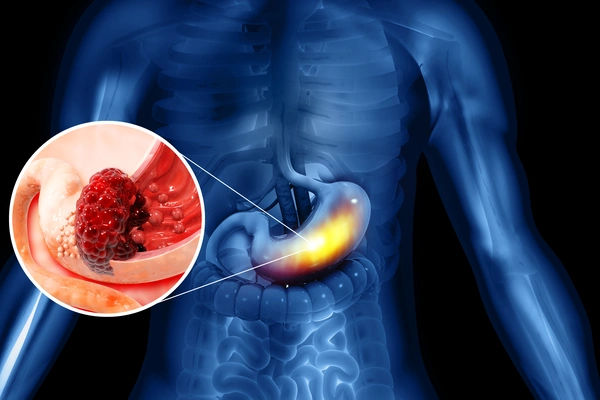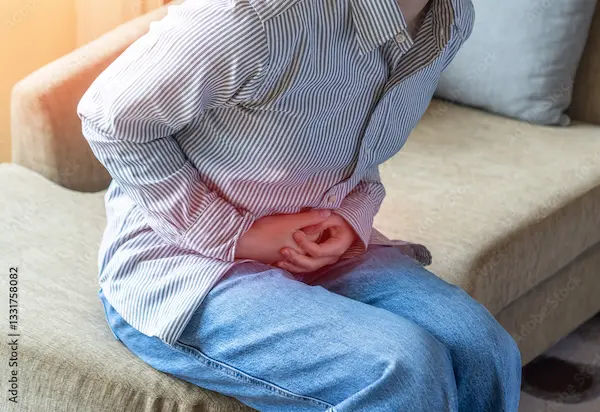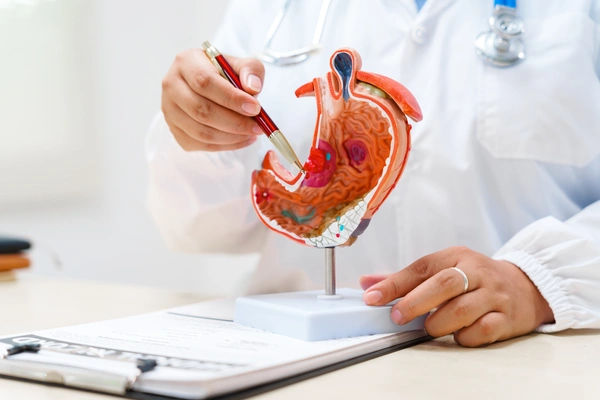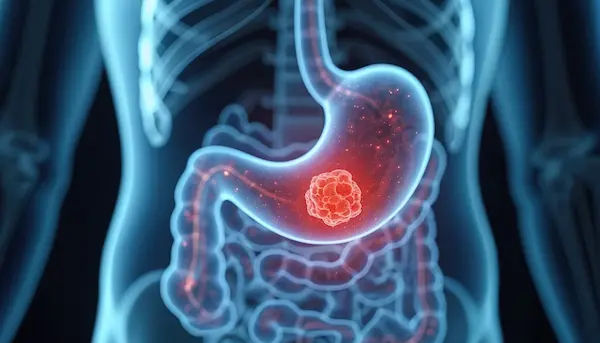Stomach Cancer Awareness Month: Know the Signs, Reduce Your Risk
November is Stomach Cancer Awareness Month. Learn the early signs, risk factors, and prevention tips to protect yourself and loved ones. Early detection can save lives—stay informed and spread awareness.

Written by Dr. Rohinipriyanka Pondugula
Reviewed by Dr. J T Hema Pratima MBBS, Fellowship in Diabetes Mellitus
Last updated on 13th Jan, 2026

Every November, the world observes Stomach Cancer Awareness Month, a crucial time dedicated to shedding light on one of the most common yet often overlooked cancers. Marked by the periwinkle blue ribbon, this campaign aims to educate the public, support patients and survivors, and champion the life-saving power of early detection. Stomach cancer, or gastric cancer, frequently begins with subtle, easy-to-dismiss symptoms that can be mistaken for common indigestion. This delay in recognition is why awareness is so critical. This comprehensive guide will walk you through everything you need to know—from the earliest warning signs and key risk factors to modern diagnostic methods and proactive prevention strategies. Our goal is to empower you with knowledge, because when it comes to stomach cancer, awareness truly can save lives.
What is Stomach Cancer?
Stomach cancer occurs when normally healthy cells within the stomach lining grow out of control and form a tumor. This process usually happens slowly over many years. Before a true cancer develops, pre-cancerous changes often occur in the stomach lining. These early changes rarely cause symptoms and therefore often go undetected.
Types of Stomach Cancer (Adenocarcinoma, Lymphoma, GIST)
The vast majority—about 90-95%—of stomach cancers are adenocarcinomas. These cancers develop from the glandular cells that form the innermost lining of the stomach (the mucosa). Other, rarer types include gastrointestinal stromal tumors (GIST), which start in special nerve cells found in the stomach wall, and lymphomas, which are cancers of the immune system tissue that can sometimes begin in the stomach.
Global and Indian Statistics: Understanding the Scale
Stomach cancer is a significant global health issue. According to GLOBOCAN 2022 data, it is the fifth most commonly diagnosed cancer and the fourth leading cause of cancer death worldwide. The burden is notably higher in Eastern Asia and Eastern Europe. In India, while the incidence is lower than in Western countries, it remains a serious concern, with variations across different regions, often linked to dietary habits and H. pylori infection prevalence. Understanding these stomach cancer statistics highlights the importance of global and local awareness efforts.
Why Stomach Cancer is Often Diagnosed Late?
The early signs of stomach cancer are notoriously vague and non-specific. Symptoms like indigestion, stomach discomfort, and a feeling of fullness after eating small amounts are easily attributed to less serious conditions like acid reflux or a stomach virus. This leads many individuals to self-medicate or wait for the symptoms to pass, delaying a crucial doctor's visit. Furthermore, there is no standard routine screening test for stomach cancer for the general population, unlike mammograms for breast cancer or colonoscopies for colorectal cancer.
How Early Detection Drastically Improves Outcomes?
The prognosis for stomach cancer is profoundly better when it is found early. When the cancer is localised to the stomach, the 5-year survival rate is significantly higher. Early-stage tumors are smaller and easier to remove completely with surgery, and they are less likely to have spread to other organs. This underscores the message of Stomach Cancer Awareness Month: listening to your body and acting on persistent symptoms can make all the difference. Early detection of gastric cancer is the single most important factor in improving survival.
Symptoms of Stomach Cancer You Shouldn't Ignore
Being able to recognize the potential warning signs is your first line of defense. It’s important to remember that these symptoms are much more likely to be caused by something other than cancer. However, if they are persistent or worsen, it is essential to get them checked out.
Early-Stage Symptoms (Often Mistaken for Common Issues)
- Persistent indigestion or heartburn that doesn't go away with over-the-counter medications.
- A sense of bloating or fullness after eating, even after a small meal.
- Mild, persistent nausea that doesn't have a clear cause.
- Loss of appetite.
Advanced-Stage Symptoms and Warning Signs
- Unexplained weight loss: A significant amount of weight loss without trying is a classic red flag for many cancers.
- Abdominal pain or discomfort, particularly in the upper abdomen.
- Difficulty swallowing (dysphagia), which may feel like food is getting stuck.
- Vomiting, which may sometimes contain blood or appear like coffee grounds.
- Blood in the stool, which may appear black and tarry (melena).
- Excessive fatigue and weakness, often due to anemia from slow bleeding.
If you experience any of these symptoms of stomach cancer, especially if they persist for more than two weeks, it is vital to consult a doctor. If symptoms persist beyond two weeks, consult a doctor online with Apollo24|7 for further evaluation.
Key Stomach Cancer Risk Factors
Understanding what increases your risk can help you and your doctor make informed decisions about your health.
Lifestyle and Dietary Factors
- Diet: A diet high in smoked, pickled, salty, and processed foods is a well-established risk factor. Conversely, diets rich in fresh fruits and vegetables appear to lower risk.
- Smoking: Smokers have a significantly higher risk of developing stomach cancer compared to non-smokers.
- Obesity: Being overweight or obese is linked to a higher risk of cancer in the upper part of the stomach (cardia).
Medical and Genetic Factors
- Helicobacter pylori (H. pylori) infection: This is a primary risk factor. This common bacterium causes chronic inflammation and ulcers in the stomach lining, which can lead to pre-cancerous changes over time.
- Family History: Having a first-degree relative (parent, sibling, or child) with stomach cancer increases your risk.
- Certain Genetic Conditions: Hereditary syndromes like Lynch syndrome and hereditary diffuse gastric cancer (HDGC) greatly increase risk.
- Pre-existing Conditions: Chronic gastritis, pernicious anemia, and stomach polyps can also elevate risk.
How is Stomach Cancer Diagnosed?
If stomach cancer is suspected based on symptoms and risk factors, doctors will recommend tests to confirm.
Initial Tests and Endoscopy Procedures
The most critical test is an upper endoscopy (or gastroscopy). A gastroenterologist uses a thin, flexible tube with a camera to examine the lining of the esophagus, stomach, and first part of the small intestine. If any abnormal areas are seen, a biopsy can be taken during the same procedure. This involves removing small tissue samples to be examined under a microscope for cancer cells.
Consult Top Specialists
Imaging and Biopsy: Confirming the Diagnosis
If cancer is found, further imaging tests are used to determine the stage (extent) of the cancer. These may include a CT scan, PET scan, or endoscopic ultrasound. Staging helps determine whether the cancer has spread and guides the treatment plan. Apollo24|7 offers convenient home collection for routine blood tests that might be part of the initial workup, though diagnosis requires specialized procedures like endoscopy.
Navigating Treatment Options for Gastric Cancer
Treatment is highly personalized and depends on the cancer's stage, location, and the patient's overall health.
Surgery, Chemotherapy, and Radiation Therapy
- Surgery (Gastrectomy): The primary treatment for early-stage cancer is to remove part (subtotal gastrectomy) or all (total gastrectomy) of the stomach, along with nearby lymph nodes.
- Chemotherapy: Uses powerful drugs to kill cancer cells. It can be given before surgery (neoadjuvant) to shrink a tumor, or after (adjuvant) to kill any remaining cells.
- Radiation Therapy: Uses high-energy beams to destroy cancer cells. It is often used in combination with chemotherapy, particularly if surgery isn't a full option.
Targeted Therapy and Immunotherapy Advances
These newer treatments represent a more precise approach:
- Targeted Therapy: Drugs that target specific genes, proteins, or the tissue environment that contributes to cancer growth. They are used for cancers with specific biomarkers.
- Immunotherapy: Drugs that help your own immune system recognize and destroy cancer cells more effectively.
How to Lower Your Stomach Cancer Risk?
- While not all cases are preventable, you can take proactive steps to significantly reduce your risk.
Dietary Changes for a Healthier Stomach
- Eat More Fruits and Vegetables: Aim for a colorful plate full of a variety of fruits and vegetables every day.
- Reduce Salt and Smoked Foods: Limit your intake of processed meats, salted fish, and pickled foods.
- Stop Smoking: If you smoke, quitting is one of the best things you can do for your overall cancer risk.
- Maintain a Healthy Weight: A balanced diet and regular exercise can help.
The Role of H. Pylori Eradication and Regular Check-ups
If you have been diagnosed with an H. pylori infection, completing the full course of antibiotics to eradicate it is crucial. This treatment can reduce inflammation and reverse pre-cancerous changes. For individuals with a strong family history or known genetic syndromes, talking to a doctor about genetic testing for stomach cancer and potential enhanced screening schedules is essential.
The Symbol of Hope: The Periwinkle Ribbon
The periwinkle blue ribbon is the universal symbol for stomach cancer awareness. Wearing or displaying this ribbon in November shows support for those affected, honors the memory of those lost, and helps spark conversations that can lead to greater public awareness and earlier diagnoses.
Conclusion
Stomach Cancer Awareness Month serves as an annual reminder that knowledge is our most powerful tool in the fight against cancer. By understanding the often-subtle signs, acknowledging the risk factors, and advocating for your health, you take control. Remember, persistent symptoms warrant a professional opinion. If your condition does not improve after trying dietary changes or over-the-counter remedies, book a physical visit to a doctor with Apollo24|7 for a thorough evaluation. Share this information with your loved ones—because awareness, sparked by a single conversation, can truly make a life-saving difference.
Consult Top Specialists
Consult Top Specialists

Dr. Sanchayan Mandal
Medical Oncologist
17 Years • MBBS, DrNB( MEDICAL ONCOLOGY), DNB (RADIOTHERAPY),ECMO. PDCR. ASCO
Kolkata
MCR SUPER SPECIALITY POLY CLINIC & PATHOLOGY, Kolkata

Dr Gowshikk Rajkumar
Oncologist
10 Years • MBBS, DMRT, DNB in Radiation oncology
Bengaluru
Apollo Clinic, JP nagar, Bengaluru
Dr. B Shravanthi Reddy
Radiation Specialist Oncologist
8 Years • MBBS, DNB(Radiation Oncology)
Manikonda Jagir
Apollo Clinic, Manikonda, Manikonda Jagir
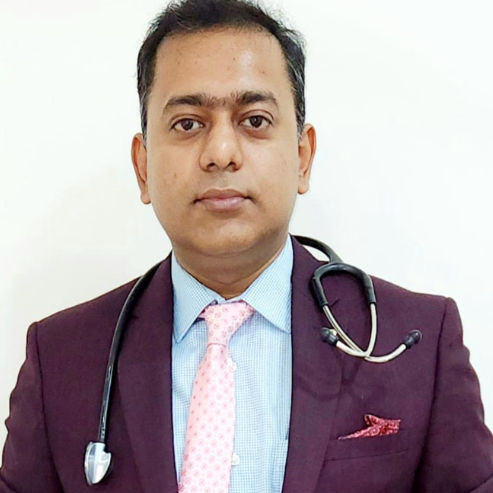
Dr.sanchayan Mandal
Medical Oncologist
17 Years • MBBS, DrNB( MEDICAL ONCOLOGY), DNB (RADIOTHERAPY),ECMO. PDCR. ASCO
Kolkata
Dr. Sanchayan Mandal Oncology Clinic, Kolkata

Dr Shaikat Gupta Director Surgical Onco
Surgical Oncologist
35 Years • MBBS (University Gold Medalist), MS, FRCSEd
Kolkata
Apollo Multispeciality Hospitals , Kolkata, Kolkata
(250+ Patients)
Consult Top Specialists

Dr. Sanchayan Mandal
Medical Oncologist
17 Years • MBBS, DrNB( MEDICAL ONCOLOGY), DNB (RADIOTHERAPY),ECMO. PDCR. ASCO
Kolkata
MCR SUPER SPECIALITY POLY CLINIC & PATHOLOGY, Kolkata

Dr Gowshikk Rajkumar
Oncologist
10 Years • MBBS, DMRT, DNB in Radiation oncology
Bengaluru
Apollo Clinic, JP nagar, Bengaluru
Dr. B Shravanthi Reddy
Radiation Specialist Oncologist
8 Years • MBBS, DNB(Radiation Oncology)
Manikonda Jagir
Apollo Clinic, Manikonda, Manikonda Jagir

Dr.sanchayan Mandal
Medical Oncologist
17 Years • MBBS, DrNB( MEDICAL ONCOLOGY), DNB (RADIOTHERAPY),ECMO. PDCR. ASCO
Kolkata
Dr. Sanchayan Mandal Oncology Clinic, Kolkata

Dr Shaikat Gupta Director Surgical Onco
Surgical Oncologist
35 Years • MBBS (University Gold Medalist), MS, FRCSEd
Kolkata
Apollo Multispeciality Hospitals , Kolkata, Kolkata
(250+ Patients)
More articles from Stomach Cancer
Frequently Asked Questions
What is the main cause of stomach cancer?
There is no single cause, but a combination of factors. A longstanding infection with the bacterium H. pylori is one of the strongest risk factors. Others include a diet high in smoked and salty foods, smoking, obesity, and a family history of the disease.
Can stomach cancer be cured?
Yes, especially when detected at an early stage. localized stomach cancer has a high chance of being cured with surgery, often combined with chemotherapy. The chances of a cure are lower for more advanced cancers that have spread, but treatment can often help control symptoms and prolong life.
How can I test for stomach cancer at home?
There is no reliable way to test for stomach cancer at home. The diagnosis requires medical procedures like an endoscopy and biopsy. However, being vigilant about persistent symptoms like unexplained weight loss, ongoing nausea, or abdominal pain and reporting them to a doctor is the most important step you can take.
Is stomach cancer pain different from normal stomach pain?
Early on, it can feel very similar to common indigestion or ulcers—a burning or gnawing pain in the upper abdomen. As it advances, the pain may become more constant and severe. The key differentiator is persistence; normal stomach pain comes and goes, while cancer-related discomfort persists and worsens over time.
What are the first signs of stomach cancer in a woman?
The signs are generally the same for all genders: persistent indigestion, stomach discomfort, feeling full quickly, mild nausea, and bloating. There are no unique early symptoms of stomach cancer that present only in women.
